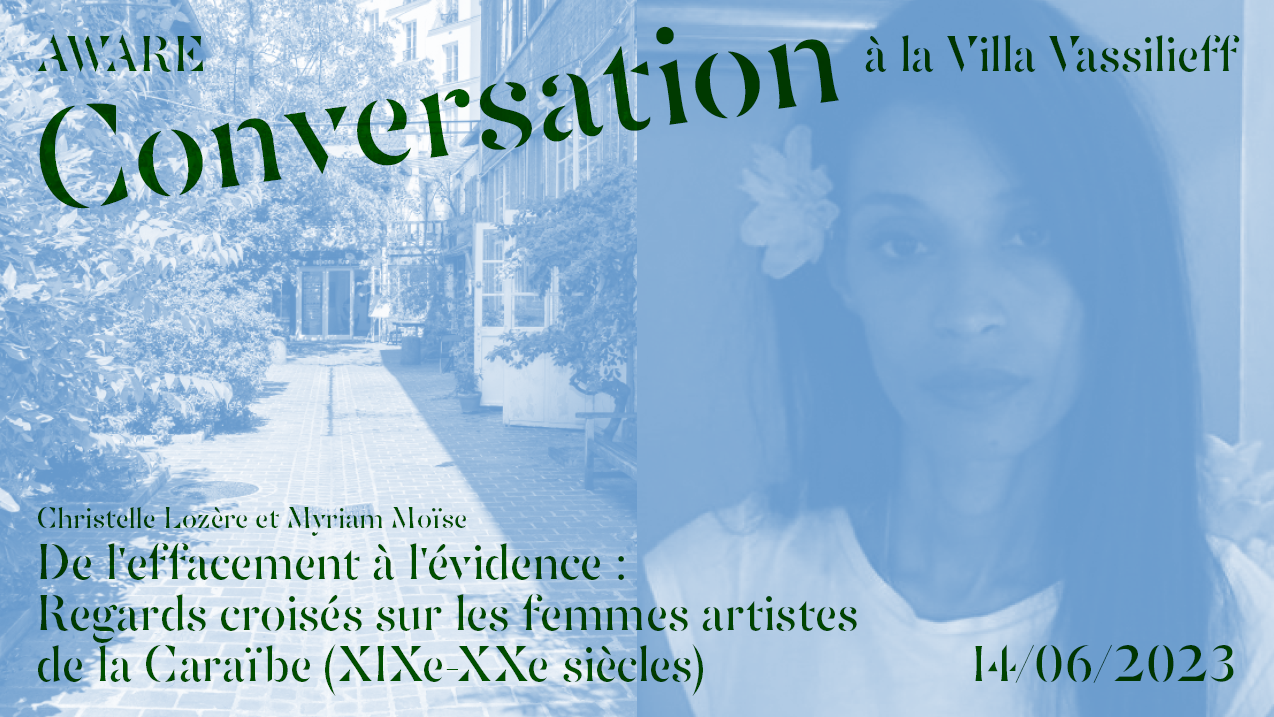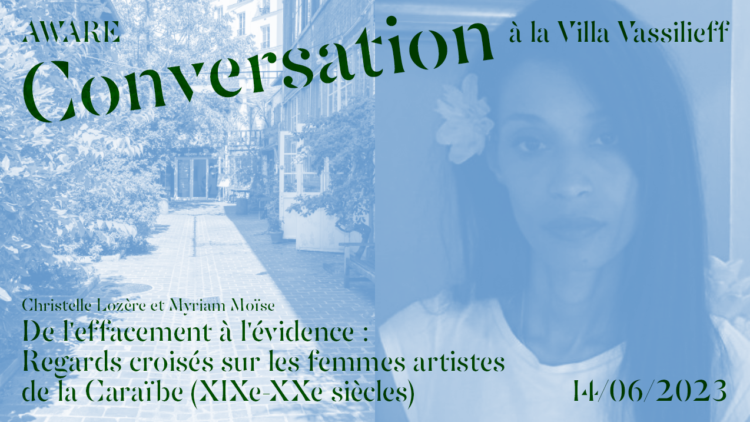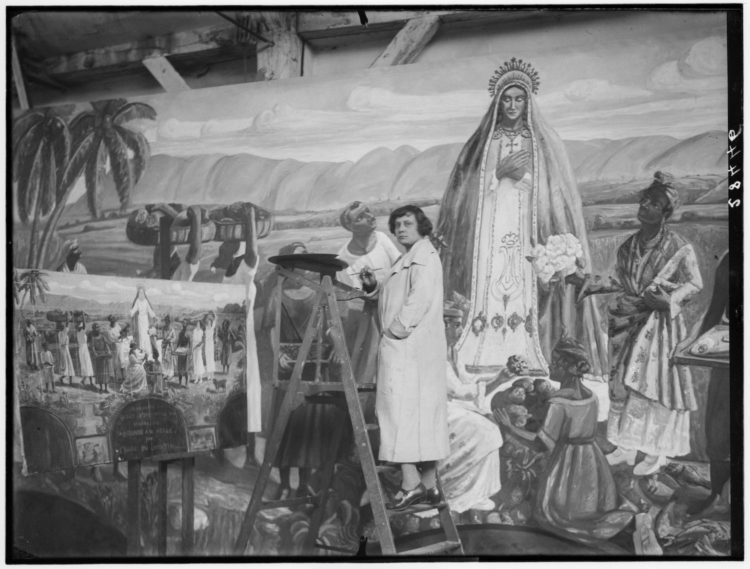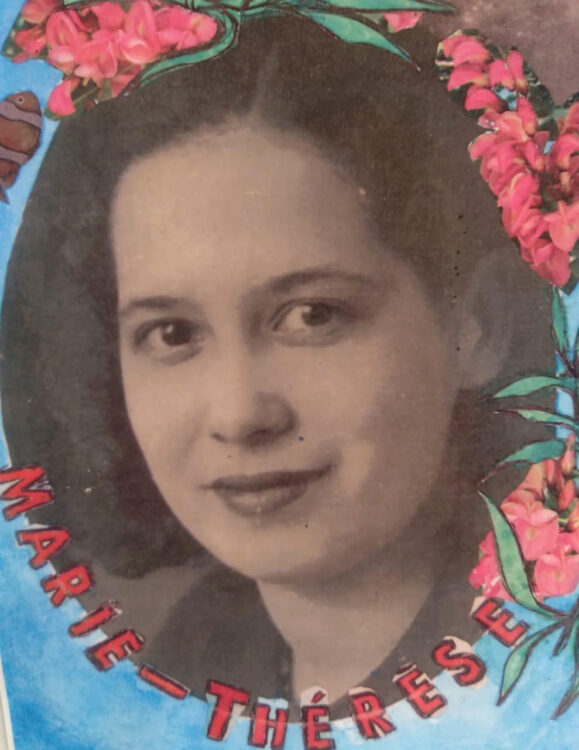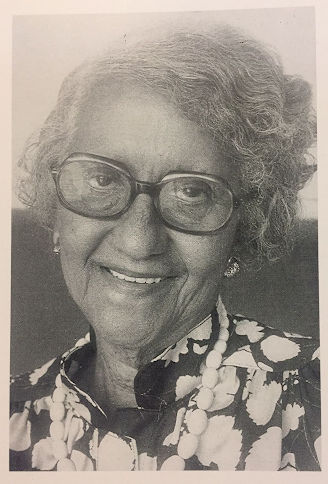Events
© Lisa Sturacci
21, avenue du Maine
75015 Paris
Montparnasse – Bienvenüe metro station, Exit 2, Lines 4, 6, 12 and 13
Villa Vassilieff is accessible to visitors using wheeled devices or who have mobility difficulties thanks to special facilities (access ramp, adapted toilets, and a lift).
In addition, several reserved parking spaces are available close to the Villa Vassilieff:
• in front of 4 rue d’Alençon, 75015 Paris
• in front of 7 rue Antoine Bourdelle, 75015 Paris
• in front of 23 rue de l’Arrivée, 75015 Paris
Consult the map of adapted parking spaces in Paris here.
Join us on Wednesday, June 14, from 6:30pm to 8:30pm at the Villa Vassilieff for the conversation between researcher-in-residence Christelle Lozère and Myriam Moïse, lecturer at the Université des Antilles, and drinks with the researchers.
As part of the AWARE residency, researcher-in-residence Christelle Lozère will publicly present “From erasure to evidence: Crossed perspectives on women artists in the French Caribbean (19th-20th centuries)” on June 14th, in conversation with Myriam Moïse.
Christelle Lozère studies the place of women painters and sculptors from the French Antilles in art history between the end of the 18th century and the first half of the 20th century: Jenny Prissay, Inès de Beaufond, Alice Albane, Germaine Casse, Marie-Thérèse Lung Fou as well as Paule Charpentier.
She focuses on the analysis of individual careers, underlining these artists’ social and racial backgrounds as well as their mobility within the Caribbean. For these few women, most of whom came from privileged backgrounds, Paris was, from the Ancien Régime onwards, the key centre of their artistic training and the main stage on which they constructed and deconstructed the Antillean imaginary of slavery, and then post-slavery, in a context in which they fought themselves, as women, for their liberties and legitimacies.
Special emphasis is placed on the presence, from the late 19th century onwards, of a number of black and métisses artists in this inclusive body of work, their (im)possibility of training in and outside the colony (Guadeloupe, Martinique), their chances or not of emerging on the insular and hexagonal art scene, their recognition, their (in)capacity to access colonial grants and to take part in the major events of their time.
This research also seeks to better understand the mechanisms through which these women artists were rejected, forgotten, and subsequently erased from the postcolonial art history of the French Antilles.
The conversation will be held in French.
Practical information
Wednesday 14 June 2023, from 6:30 to 8:30 pm
This residency is part of the research program « The Origin of Others. Rewriting Art History in the Americas, 19th Century – Today ».
Christelle Lozère is researcher-in-residence at AWARE. She is a lecturer in contemporary art history at the Université des Antilles, co-leader of the FRACA team (UMR CNRS LC2S) and an art critic. She is the author of Bordeaux colonial (Ed. Sud Ouest 2007), La Croisière du Tricentenaire des Antilles et de la Guyane. Construction d’un imaginaire transatlantique(Hémisphères, Maisonneuve & Larose, 2022) and around forty articles on colonial art history, the French Antilles and Caribbean in the slavery and post-slavery context (19th century – 1946). Winner of the 2011 Musée d’Orsay prize for her thesis defended at the University of Bordeaux III, she has also been a visiting scholar at the INHA and the Clark Art Institute (USA). She is currently in charge of the programme Acteurs, images et pensées en réseaux, Europe Caraïbe (FMSH) and Les rendez-vous numériques en Histoire de l’art des Antilles, carte blanche of the INHA.
Myriam Moïse is a lecturer in cultural studies at the Université des Antilles and a researcher at the Laboratoire Caribéen de Sciences Sociales (affiliation CNRS, LC2S-UMR 8053). She obtained a PhD in Postcolonial Studies from the University Paris 3 La Sorbonne Nouvelle and a PhD in “Literatures in English” from the University of the West Indies, Trinidad. Her research interests include gender studies, cultural studies, and postcolonial studies, with a focus on the production of intellectual, political and aesthetic works by women in the Caribbean and the Americas. Her research has been funded by several fellowships in Europe and the USA: New York University (Summer 2009), Brown University (Spring 2012), University College London (Summer 2018), and most recently the Fulbright Excellence Award at Emory University, Atlanta (Spring 2020). Around thirty of her articles and chapters have been issued in English, French, Spanish and Portuguese in international magazines and collective publications. Myriam Moïse is also scientific director of the research seminar series Terre de Femmes, which highlights the contributions of women artists, writers and intellectuals, and invites participants to think about the major issues in the Caribbean and the Americas through the feminine lens.
